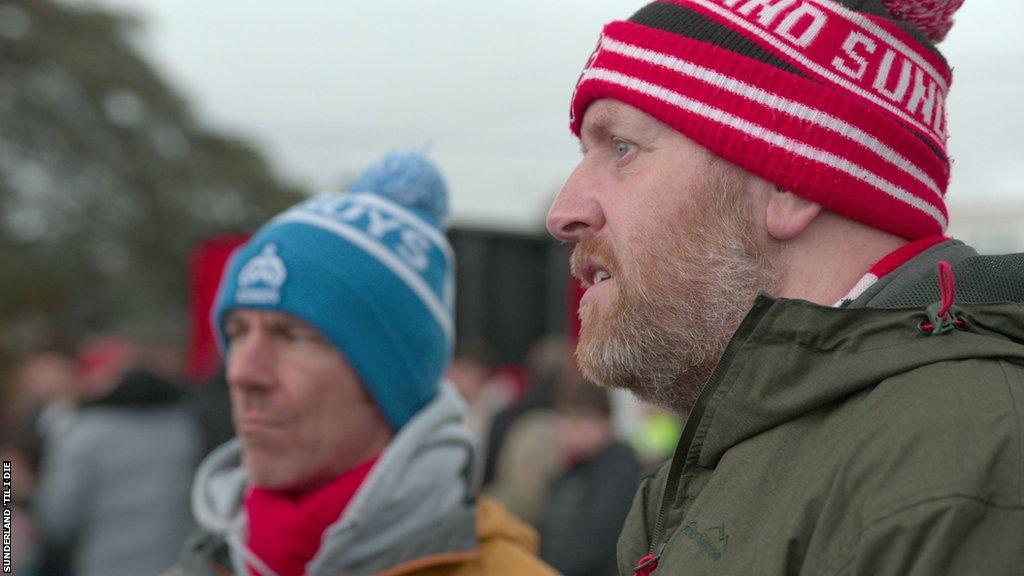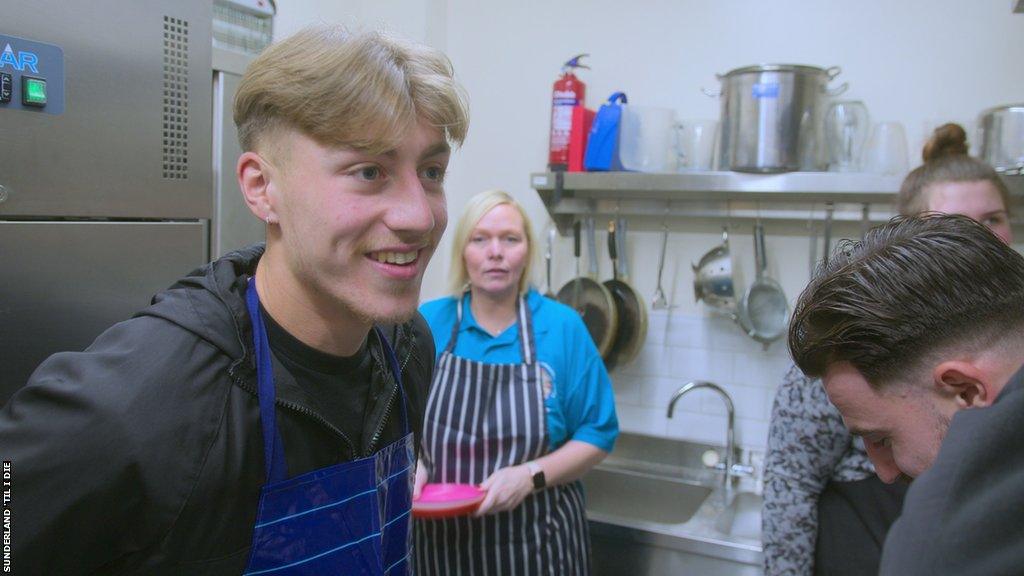Sunderland 'Til I Die: Three takeaways from third series of the documentary
- Published

Season ticket holder Chris Nicks calls Sunderland "something you can throw your hope into" despite "lean years" in League One
The third and final instalment of Sunderland 'Til I Die strikes a more optimistic note than previous series, ending with promotion back to the Championship, but there is still plenty of grit.
Series one was released in December 2018, months after Amazon Prime's All or Nothing: Manchester City documentary.
While the latter documented Pep Guardiola's team marching towards a Premier League title-winning season, by contrast, Fulwell 73's warts-and-all series captured a club on their way to a second successive relegation to League One. Series two then documented Sunderland's failure to get out of the third tier in the 2018-19 campaign.
The final series is only three episodes long and charts the 2021-22 season, when the Black Cats ended four years in League One by securing promotion to the Championship with victory over Wycombe Wanderers in the play-off final.
As well as events on the field, there is still plenty of focus on the real lives and mental health of the Sunderland community.
Here are three takeaways from the documentary.
A Wembley win at last, but sad losses off the pitch
Those who watched series one and two will recognise some familiar returning faces - including ex-serviceman Andrew Cammiss, straight-talking taxi-driver Peter Farrer and best friends Michelle Barraclough and Ian Wake.

Farrer says supporting Sunderland is like a 'rollercoaster'
Barraclough delivered the definitive line of series two when she asked "why is it never us celebrating?" after a stoppage-time defeat by Charlton Athletic in the 2019 League One play-off final.
In series three, her and "bestie" Wake are off to Wembley again, wearing all the psychological scars of past defeats.
Wake, who has downsized his house in order to find money to follow the team, was at Wembley to see Sunderland win the FA Cup in 1973 but after that watched them lose in the 1985 League Cup final, the 1990 Division Two play-off final, the 1992 FA Cup final, the 1998 Division One play-off final, the 2014 League Cup final and the 2019 League One play-off final.
He calls it "quite a magical thing" to see his team end a 48-year wait for another Wembley win, saying, "just this time for it all to go right was truly wonderful".
Sadly, Wake died in March 2023 and the series closes on his funeral. Local priest Father Marc Lyden-Smith describes the superfan talking about Sunderland even in his final moments and gives a reflection on enduring passion, saying: "Love doesn't end with death, and loving Sunderland Football Club is a love that stays with you for all eternity."
There are also tributes in episode three to Louise Wanless, Sunderland's former head of communications, who died in 2021. Kit man Stephen Aziz, who remembers Wanless as "a massive character", has shirts printed with her name to take to Wembley.

Wake said it was 'perfect' for him to see his 'bestie' experience a win for Sunderland at Wembley
Billionaire owner keen to show his heart is in football
Series one gave us an insight to then-chief executive Martin Bain's boardroom, with famous scenes including a failed deadline-day attempt to sign Ross McCormack from Aston Villa.
In series two, co-owners Stewart Donald and Charlie Methven attempted to take the club out of financial ruin with some interesting innovations. No-one who watched can forget Methven mooting the idea of updating Sunderland's walk-on music to a Tiesto track.

Owners Juan Sartori and Kyril Louis-Dreyfus met playing football on 'a tiny island' in the Maldives
In series three, we meet a new club owner in the form of Swiss-French billionaire Kyril Louis-Dreyfus, who became the youngest chairman in English football when he took charge in February 2021 aged 23.
Despite his age and an Instagram profile suggesting a lively lifestyle, the 26-year-old is at pains to show his heart is in football.
"Most people in my position wouldn't choose to move to the north east and get involved with a football club, especially one in the third tier," he says.
Louis-Dreyfus' late father Robert owned Marseille, and the Sunderland owner draws comparisons between the two one-club cities where the people "really live and breathe the football club".
A team of misfits and underdogs
Among the infamous moments from series one were midfielder Jack Rodwell telling a team-mate there was "no chance" he would play in a forthcoming match, and the fallout after Darron Gibson was filmed criticising team-mates while in a pub.
When winger Jack Clarke joined Sunderland on loan in January 2022, the 23-year-old says that he was assured it was going to be "nothing like" what he had seen in the documentary.
However, when manager Lee Johnson was controversially sacked "two days later", with the team just two points off the top of League One, Clarke says asked himself, "what have I got myself into?" fearing another "nothing loan" where he would "achieve nothing".
Clarke has gone on to become a key figure at Sunderland; he is their top scorer in the Championship this season with 14 goals and four assists.
California-born academy product Lynden Gooch speaks in a hybrid transatlantic twang about being proud to call himself an "adopted Mackem".
One-time wonderkid Patrick Roberts - who joined Manchester City at 18, then went on loan to six clubs over the next six and a half years - talks about finding a home at Sunderland
Former Manchester City hopeful Patrick Roberts signed for Sunderland in January 2022 after joining Manchester City at 18, before going on loan to various clubs.
Now 27, Roberts talks about not feeling "valued or wanted" as a loanee, saying by contrast that when Sunderland came in for him on a free transfer, he "wanted to be part" of the project there.

Jack Clarke and Patrick Roberts help to feed ex-servicemen in episode two
Then there is the story of striker Ross Stewart's rise.
After almost quitting football, Stewart rediscovered his love for the game at Scottish team Kilwinning Rangers. In 2016, his dad paid £500 of his own money so Rangers would release his son to join Scottish fifth-tier team Albion Rovers.
After signing for Sunderland in 2021, he netted 40 times in 80 appearances for the club, including a goal in the 2022 League One play-off final win. Stewart also received two call-ups for Scotland that year; though has been troubled by injuries for the past 12 months. He has made just two appearances for Southampton since joining them in September.

Did the great Rosa Parks watch Shrek? Have a go at sorting historical fact from fiction in our latest time-twisting quiz
Cautionary tales aren't just for kids: Dive into the dark side of fairy tales for grown-ups!
